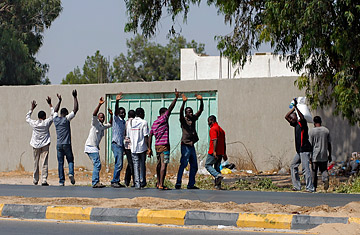
African migrant workers whom rebels had suspected of being Gaddafi mercenaries stand outside the military base in Tripoli on August 28, 2011. Hundreds of migrant workers remain stranded in Libya after six months of war, unable to flee the country.
(2 of 2)
More than 120 other suspects — most of them foreign Africans — are being held at a school in central Tripoli, in the absence of a functioning government or justice system. There are rumors of other ad hoc prisons. And a guard, Jamal Mohamed, is sure the captives are snipers. "Polisario," he adds, referring to a resistance movement in Western Sahara, from which Gaddafi allegedly recruited. Some of the captives have been punched in the eyes or nurse bandaged wounds sustained during fighting. Many were apprehended during battles in Gaddafi-stronghold neighborhoods. At least two admit to being members of the regime's forces.
But many others say they were captured by accident or targeted out of racism or xenophobia. Abou Bakr from Niger says he had merely gone outside to look for water but lived in the wrong neighborhood, one where rebels happened to be searching for loyalists.
Tripoli is a racially diverse city, with skin colors ranging from pale to very dark — largely because Gaddafi encouraged such integration. And the Libyan rebels display the same diversity among their ranks. But a latent racism festers, along with the hazy rules that only locals seem to understand that distinguish between "good" black people from "bad." The logic follows the lines of Gaddafi's uneven favors, which even in Tripoli often served personal ambitions more than the public good.
The Abu Slim neighborhood near Gaddafi's Bab al-Aziziyah compound has long been a regime stronghold manipulated carefully by the ruling family. "[Gaddafi's son] Saif al-Islam used to come here and give kids 200 dinars and a Kalashnikov. [His other son] Khamis would come too," says Ramadan Ali Osman, whose apartment was destroyed in the recent fighting. A poor neighborhood, populated lightly with regime officials and a large number of African migrants, Abu Slim proved a ripe recruiting ground for cheap government fighters. "They would drive in — the brigades — and recruit kids for their forces," says Osman. Just days before the rebels captured Tripoli, residents say Gaddafi's son Saadi was the last one to make an appeal. "Saadi came here to form a brigade out of the youth," says Adil Masoud Moussa, a resident. "He gave money to a big boss in the neighborhood to give to the youth to fight against anyone who hated his father."
The bought loyalties have contributed to an atmosphere fraught with racial tensions throughout Tripoli and Gaddafi-free Libya. Children sing songs about "Abu Shafshoufah" — a derogatory nickname for Gaddafi that translates roughly as "father of the frizzy hair." And some of the rebels seem to characterize their ranks along tribal or geographic lines, as consisting of originals and followers. "Most of the people here in Souk al-Jumaa are native to Tripoli, unlike the people in Abu Slim whom he brought from other parts of Libya," says Ashraf Hajaj, a resident of a rebel-stronghold neighborhood.
Back at the makeshift camp at the port, the main thing on most people's minds is escape. Many say they have trouble sleeping after encountering violent attacks en route to the coast. And most are afraid to venture outside even to fetch badly needed supplies. "If you go outside, you might get caught. So we drink saltwater," says Alexander Zenda, a Nigerian. Four days ago, six Nigerian boys left the camp to search for drinking water and never came back, he adds.
At night the city is racked by gunshots. Since the rebel takeover of Tripoli last week, a few philanthropists have ventured into the camp with gifts of food and water, they say. But for months, men with guns used to come to loot and beat people up, the camp's inhabitants say. "They came in here robbing our gas, stealing our property," says Margaret Asanti, a Nigerian who has been at the camp for almost two months with her two young children. She lived a relatively stable existence in Tripoli for 12 years. But she says, "If you take me to my country, I'd be very happy. I'm tired of being in this place."
